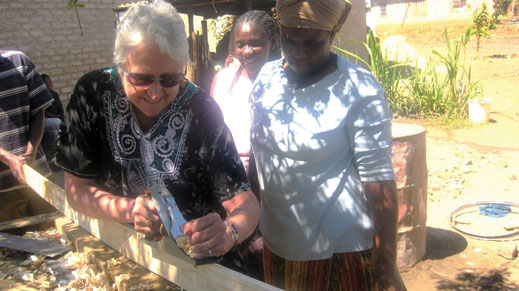Shan Cretin ’68, PhD ’75
Living in London with her U.S. military family as a young girl, Shan Cretin saw the rubble from buildings bombed out during World War II. When the family moved to Alabama in the 1960s, she “witnessed the courage of the civil-rights activists and the power of nonviolence to right a great injustice,” she says. Now she travels the world as the general secretary of the American Friends Service Committee (AFSC), a Quaker organization that works to bring peace and healing to people scarred by conflict.

Cretin, a mechanical-engineering major and the first person in her family to attend college, had planned to work in automotive engineering. But upon reading Ralph Nader’s Unsafe at Any Speed, she decided to devote her energies to socially responsible public health.
After earning a master’s in public health at Yale, Cretin returned to MIT to study operations research and then taught for 15 years at the schools of public health at Harvard and UCLA. In 1985 she taught in Beijing on an exchange program, and she spent the next decade developing a rural health insurance system in Sichuan. Then she began consulting privately on health care all over the world.
In the aftermath of September 11, Cretin pondered how to promote peace. In 2003 she joined the AFSC as a regional director, overseeing community-based peace and justice work in the Pacific Southwest, and she became general secretary in 2010. She is gratified by new research concluding that nonviolent efforts are twice as likely as violent efforts to end a repressive regime or occupation. “For a long time, people didn’t do research on this,” Cretin says. “There’s a growing opportunity to question spending trillions on war and weapons.”
When Cretin touches down in a new place to assess a situation, she draws on a surprising source from her MIT days: a contemporary-literature class led by Barry Spacks, which included visits from the likes of Norman Mailer and Jorge Luis Borges. Since the class studied new works, no one could predict their lasting value. “I learned to analyze the worth of a new idea without having someone else set the framework,” she says. “It opened me up to risk-taking—to feeling secure in acting on what I believe is right.”
Cretin and her husband, who live in Philadelphia, have three daughters and three grandchildren. She is on the board of directors of the California Endowment, a large private health-care foundation. As a hobby, she makes guitars in her garage, a pursuit she began during a January IAP class.
Keep Reading
Most Popular
Large language models can do jaw-dropping things. But nobody knows exactly why.
And that's a problem. Figuring it out is one of the biggest scientific puzzles of our time and a crucial step towards controlling more powerful future models.
The problem with plug-in hybrids? Their drivers.
Plug-in hybrids are often sold as a transition to EVs, but new data from Europe shows we’re still underestimating the emissions they produce.
Google DeepMind’s new generative model makes Super Mario–like games from scratch
Genie learns how to control games by watching hours and hours of video. It could help train next-gen robots too.
How scientists traced a mysterious covid case back to six toilets
When wastewater surveillance turns into a hunt for a single infected individual, the ethics get tricky.
Stay connected
Get the latest updates from
MIT Technology Review
Discover special offers, top stories, upcoming events, and more.